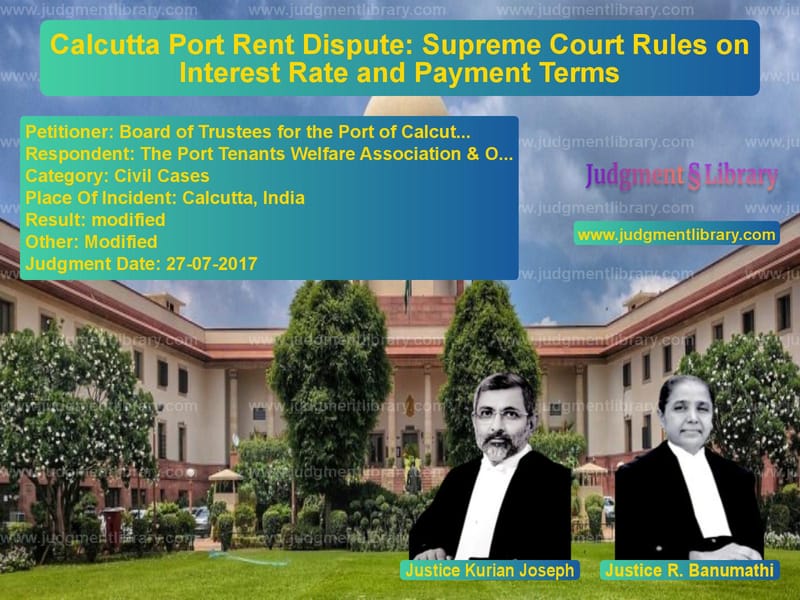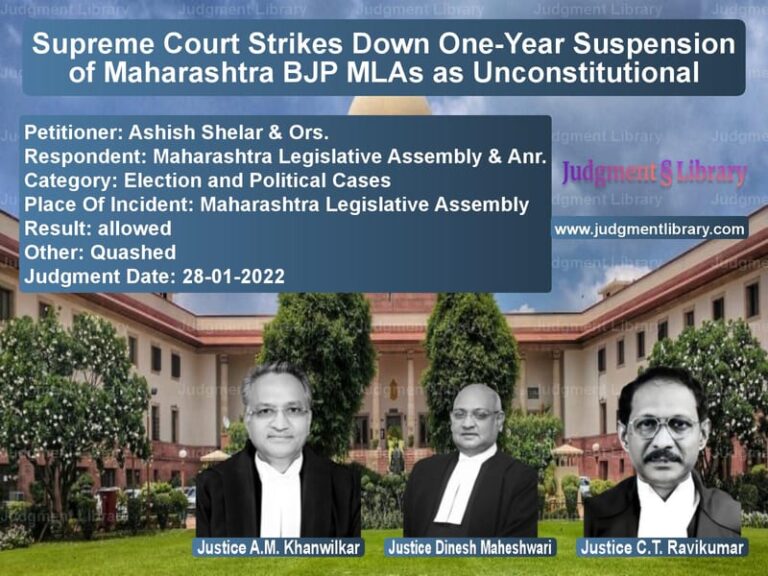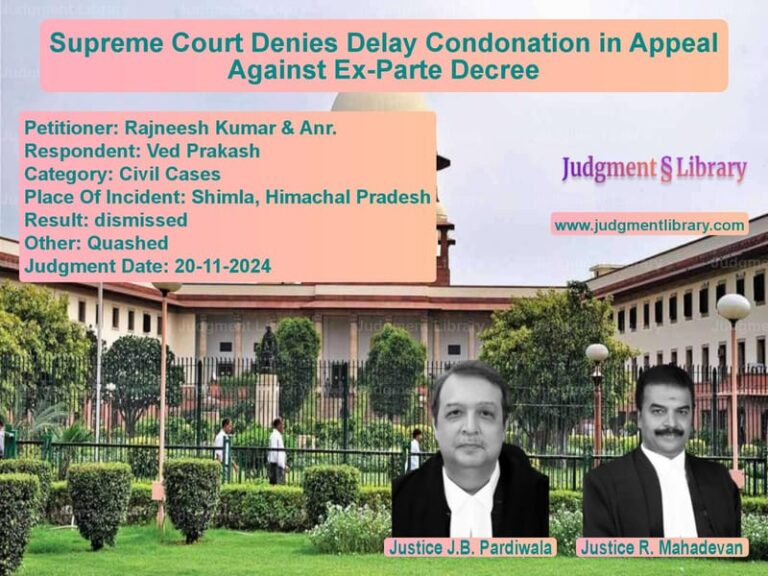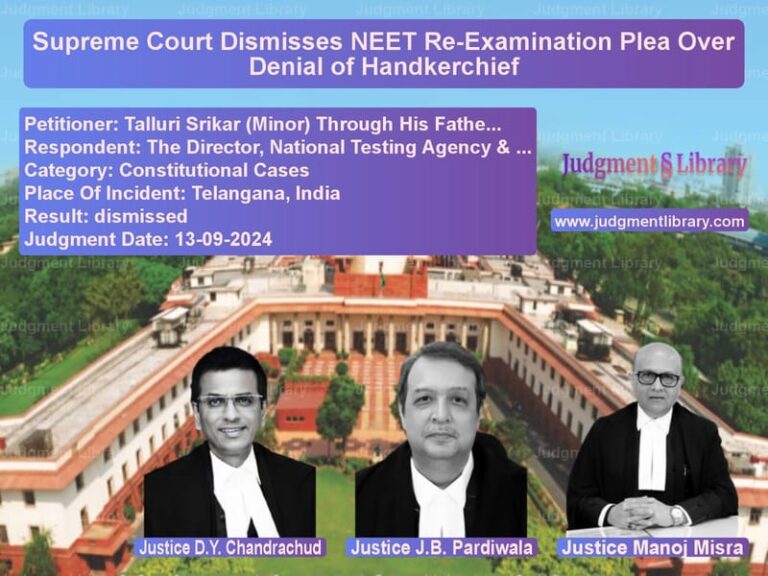Calcutta Port Rent Dispute: Supreme Court Rules on Interest Rate and Payment Terms
The Supreme Court of India recently decided on a long-standing dispute between the Board of Trustees for the Port of Calcutta and the Port Tenants Welfare Association regarding the revision of rent and the rate of interest applicable on arrears. The case revolved around the rate of interest imposed on overdue rent payments and the legality of its fixation by the High Court. This ruling clarifies key legal principles related to port trusts, rental agreements, and interest levies under the Major Port Trusts Act, 1963.
Background of the Case
The dispute arose when the Board of Trustees for the Port of Calcutta revised the rent payable by port tenants. While the tenants initially contested the rent revision, they later withdrew their challenge before the High Court. The High Court then limited its decision to determining the payment terms, allowing the tenants to clear arrears in 36 installments and imposing an interest rate of 6% per annum on the overdue rent.
The Board of Trustees for the Port of Calcutta, dissatisfied with this decision, appealed to the Supreme Court, arguing that the applicable interest rate should have been between 15% and 18% per annum as per the schedule fixed by the Board under the Major Port Trusts Act, 1963.
Arguments of the Petitioner (Board of Trustees for the Port of Calcutta)
The petitioner put forth the following key arguments:
- The High Court erred in fixing the interest rate at 6% per annum without considering the interest rate prescribed under the Major Port Trusts Act, 1963.
- As per the statutory provisions, the interest rate for overdue rent should have been between 15% and 18% per annum.
- The High Court’s ruling was being used as a precedent in other cases, affecting the financial interests of the port trust.
- The decision of the High Court, if left unchallenged, would set a negative precedent, weakening the ability of port trusts to recover outstanding dues from tenants.
Arguments of the Respondent (Port Tenants Welfare Association)
The respondents countered with the following arguments:
- The tenants had already agreed to pay the revised rent and had begun clearing arrears in installments as per the High Court’s order.
- The High Court’s decision to impose 6% interest was made considering the peculiar circumstances of the case.
- The interest rate fixed by the Board was arbitrary and excessive, and the High Court had appropriately intervened to prevent undue financial burden on tenants.
- The judgment should not be considered a binding precedent for future cases, as it was specific to this dispute.
Supreme Court’s Analysis and Judgment
The Supreme Court examined whether the High Court had the authority to fix the interest rate at 6% per annum, given that the Board had prescribed a higher interest rate under the Major Port Trusts Act, 1963.
The Court observed:
“The party respondents herein had actually given up the challenge on the revision of rent before the High Court. Therefore, the High Court restricted itself only to this point.”
Further, the Court noted that while the High Court had provided relief in the form of a lower interest rate, it had not specifically adjudicated the legality of the Board’s prescribed interest rates.
To prevent further litigation and ensure fairness, the Supreme Court invoked its jurisdiction under Article 142 of the Constitution to provide a final resolution to the dispute. The key aspects of the ruling were:
- The High Court’s order fixing interest at 6% per annum was set aside.
- Since the tenants had already paid interest at the High Court’s prescribed rate, no further interest would be levied on them.
- The ruling was case-specific and should not be treated as a precedent for determining interest rates in other disputes.
- The Court exercised its extraordinary jurisdiction to bring a quietus to the matter, ensuring finality in the dispute.
Final Verdict
The Supreme Court ruled that while the High Court’s interest fixation was incorrect, no additional financial burden would be imposed on the tenants who had already paid as per the High Court’s order. The judgment clarified that the ruling was not a precedent for future cases, thereby preventing its misuse in unrelated disputes.
Implications of the Judgment
This ruling has significant implications for port trust authorities, tenants, and judicial intervention in financial disputes:
- Affirms that statutory bodies have the authority to fix interest rates under relevant legislation.
- Clarifies that High Courts must carefully consider statutory provisions when intervening in financial disputes.
- Ensures that extraordinary judicial relief under Article 142 is used to resolve disputes fairly without setting binding precedents.
- Provides certainty to port trust authorities and tenants regarding the legal framework governing rental agreements.
This judgment reinforces the principle that statutory provisions must be upheld in financial disputes while ensuring that judicial interventions do not cause undue hardship to litigants.
Don’t miss out on the full details! Download the complete judgment in PDF format below and gain valuable insights instantly!
Download Judgment: Board of Trustees fo vs The Port Tenants Wel Supreme Court of India Judgment Dated 27-07-2017.pdf
Direct Downlaod Judgment: Direct downlaod this Judgment
See all petitions in Property Disputes
See all petitions in Contract Disputes
See all petitions in Damages and Compensation
See all petitions in Judgment by Kurian Joseph
See all petitions in Judgment by R. Banumathi
See all petitions in Modified
See all petitions in Modified
See all petitions in supreme court of India judgments July 2017
See all petitions in 2017 judgments
See all posts in Civil Cases Category
See all allowed petitions in Civil Cases Category
See all Dismissed petitions in Civil Cases Category
See all partially allowed petitions in Civil Cases Category







